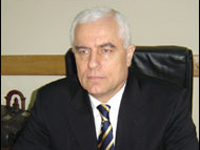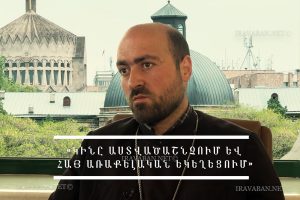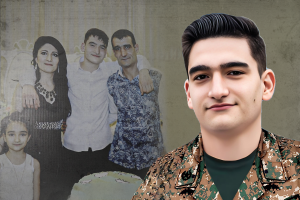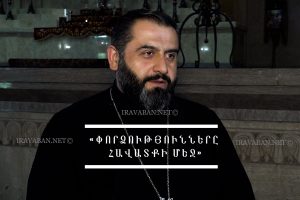THE RESULTS OF LEGAL AND JUDICIARY REFORMS ARE INADEQUATE
– Mr. Ghazinyan, what do you think about the state if legal education in our country? Do you think the current system of legal education in Armenia is able to prepare lawyers with high professional and mental values who are able to realize actual and unalterable reforms in the legal system of our country?
– Today we may see rather serious reevaluation of the social meaning of lawyer’s profession in our society, and currently this is one of the most required professions. Yet we think this fact is not evaluated and analyzed seriously and fundamentally among us. Actually the activities aimed, which are directed to the reforms in the legal sphere are limited mainly in the bounds of reconstruction of the legislation and the legal practice. No due attention was paid to the circumstance that the efficiency of the reforms in this sphere is directly connected with the quality of the legal education in the republic, as well as from the level of professionalism of the lawyers. The growing need of qualified lawyers promoted the establishment of a number of legal educational establishments. Unfortunately, we should admit that the major part of these institutes consider the income but not the education as their primary goal. I have to mention with a heavy heart that the economic, agricultural, and technical higher educational establishments, which lack the elementary conditions for providing the legal education, started educating the lawyers as well. Such educational establishments lack the necessary educational and methodological basis, as well as the qualified lecturers. And this is a serious cause for the doubts referring to the professional level of the lawyers who studied there. In addition, the accreditation process of private law schools is carried out with serious shortcomings, and we may realize that under such conditions there is a real threat to discrediting of the legal education and devaluation of the lawyer’s profession, which in its turn may have a negative impact over the natural operation of the whole State machinery.
In this respect we need new approaches in the sphere of the legal education, and these approaches should be systematized and of logical character, as well as aimed at elaboration of new ways and methods of the legal education, improvement of the nature and content of the legal education, its orientation to the requirements of the social development. And eventually our daily work is aimed at solving these problems. The Law Faculty of Yerevan State University has a rather crucial role. Currently the Faculty is in the stage of serious change and development. The Faculty is has a leading role in the system of university education of the republic and plays a key role in educating the new generation of lawyers who will be able to solve the most important outlined problems.
– Can you show the main problems that currently exist in the system of legal education in the faculty which you administer now and which are the ways for their solution?
– The Law Faculty of Yerevan State University is the only higher educational establishment in the Republic Armenia which educates broad specialists/lawyers. It exists for over 70 years and has prepared more than 10000 graduates. It is due to mention that the main problem of our faculty has not changed, but the conditions for its realization are changed. The need to legally ensure the fundamental reforms, which currently are taking place in all spheres of the public life, conditioned the renewal of the legal education and the necessity to establish a new law school, which meets the current international requirements. Transition to the three-stage education system (bachelor’s, magister’s and post graduate degrees), in its turn requires new approaches in the sphere of legal education. During the last decade different activities that are aimed at fundamental reformation of the legal education have been carried out and currently are under way in our faculty. These activities have the aim to improve the educational process, train and retrain the new staff of lecturers, development of the law faculty as a scientific center, as well as to solve the issues of partner relations with the law faculties of foreign institutes on mutually favorable conditions. As a result we may mention the wide scale projects “Support to the Establishment of the Chair of European and International Law and the Integration Center in the YSU and Support to the Partnership and Cooperation Project” and “Support to Sustainable Reforms of the Sphere of the Higher Legal Education,” which promote to the process of integration of the law faculty of YSU to the European system of legal education. Despite the notable positive progress, which has been recorded in these spheres, we continue work on innovation of the educational plan and its adaptation to the requirements of the current public life, elaboration of new educational and methodical literature, training and retraining of new scientific/pedagogical staff, and establishing sustainable cooperation with the foreign law schools. We think these are the problems that any modern law school may face and their successful solution may be the jerk for their final establishment. At the same time we should note that successful organization of the education process widely depends upon the perfect mechanism for the selection of students who are the main target group. It is not a secret that the number of students grows annually, which in its turn results reduction of the quality, and this is conditioned with the current system of entrance examination.
– To what extent has the system of legal education of Armenia integrated in the system of international legal education. Which are the development tendencies? And what opportunities does this provide to the students of the Law faculty of YSU to continue education in the foreign law schools, as well as to invite lecturers (even for a short period) from the famous foreign law schools?
– At present it is impossible to find or to show an educational establishment, which may exist out of international educational system, and without links with them. In this respect the legal educational establishments are not exceptions. The successful integration of the legal education system of our republic into the international legal education system is the passport to its progressive success. Grasping the importance of this principle our faculty has undertaken steps for establishing stable contacts with foreign universities and law schools. This resulted in establishing a partnership network with a number of law schools from some CIS countries, as well as from the US and European countries. This network helps to organize the training and retraining activities of our young lecturers, as well as promotes carrying out joint scientific research and realization of different projects. We should also add that recently the Law Faculty of YSU has become a full member of European Law Faculties Association (E.L.F.A.). This authoritative organization joins 160 members from the EU member and non-member states. The current and most important direction of E.L.F.A. activities are legal educational reforms in Europe.
– What do you think about the role of informal education (such as the Phillip Jessup International Law Moot Court Competition, various scientific contest/conferences for the law students) for the development of professional skills of the law students? Is the non-formal education developed in the Republic of Armenia and which is the role of the Law Faculty of EYU in this sphere?
– I am definitely positive. I may say that this type of education is introduced in the teaching process of our faculty as much as possible considering it as one of the most efficient way for obtaining knowledge. We promote and if necessary finance or provide other necessary support to our students to participate in domestic as well as international events. In addition the annual scientific conference/contest, which is organized by the scientific society of or Faculty, has become traditional. Students from the law faculties of the other state and private institutes are invited to participate as well. But as a rule, representatives from only 4 or 5 institutes attend these events, and unfortunately I should say that they are not serious opponents for our students, but for a few exceptions.
– Is the legal literature in Armenian language, which is published currently enough for successful organization of the education process? What is your opinion on the existing situation in this sphere?
– Today we can give a positive answer to this question as well, considering the fact that during the last 6-7 years textbooks and other educational handouts in Armenian language, which refer to the main branches of the law, have been prepared with the efforts of the magisterial staff (professors and lecturers) of the YSU and published. Some of them were republished as well. Currently we are working on elaboration of supplementary educational literature (casebooks, practicums, readers, etc.). By the way we already have the first results.
– And the last question. How would you evaluate the current state of the RA legal and judiciary system? Which is the input of the Law Faculty of YSU, or what can it be for the improvement of the legal and judiciary system?
– I think the results of legal and judiciary reforms are not satisfactory. The three years term for realization of these reforms was not realistic from the very beginning. In fact this is an ongoing and non-stop process. Just at this moment we may speak only about the completion of the first stage of legal and judiciary reforms, which resulted in adoption of the main legal acts (civil, criminal procedural, civil procedural, and court) that are the basis for the reforms and formation of the judiciary system. The current phase of legal and judiciary reforms, which starts after the constitutional reforms, is aimed at improvement of the current legislation and elaboration of the new legislation, as well as to consolidation of the grounds for the independent judiciary power through restoration of the lost public trust. To achieve this we need to carry out a long and consistent work. The Faculty of Law of YSU are not aside from this process. Our experts are actively involved in different working groups, which work on the elaboration of normative acts that are the basis of the legal and judiciary reforms. In addition the experts form the Faculty of Law of YSU realize expertise of the RA draft laws.















